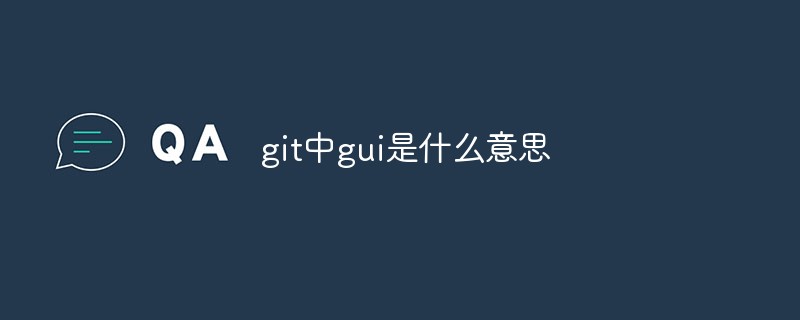
gui in git means "visual tool". It is the default graphical tool of git. It is an interface display format for human-computer communication that allows users to use input devices such as the mouse to manipulate icons on the screen. or menu options.

The operating environment of this article: Windows 7 system, Git version 2.30.0, Dell G3 computer.
What does gui mean in git?
This article introduces the use of Git Gui, Git’s official visualization tool, and tries to include pictures and texts. , so that all friends who are new to Git can quickly get started and use Git for project development.
1. Create a new local repository
First, we open the Git GUI, which is an interface like this, select the first item, and create a new repository.
Then select the project path where you need to perform version management. I chose a LoginDemo project.
When you create a repository, you can see an additional .git folder in the path of the project (if you set the hidden file to be invisible, you will not see it)
In Git In Gui, if Unstaged Changes contains files, click Stage Changed first to add the uncached changes to the cache, and then click Commit; otherwise, you need to click Rescan first to scan the changed files in the project. Note: The submission description must be filled in, otherwise it cannot be submitted.
After the submission is successful, we can see the history of our submission in Repository->Visualize All Branches History (this is submitted to the local rather than to the remote server). At this point, the local repository has been created successfully.
2. Submit the project to the remote
In the previous step, we have used Git to establish a local repository, and then we need to submit the project to the remote server for collaboration with colleagues or others. Participants jointly participate in the development. General open source projects use github as the remote server. In fact, after creating a local resume repository, you only need to click push to upload it directly. But we have not yet established a connection between local Git and github and set up a security protocol.
First of all, we need to have our own github account, and then create a new repository on github, also called LoginDemo (it can be different from the local project name).
In Git Gui, select Remote->add to add a remote server. There are two ways to fill in the remote server information. Fill in the https address or ssh address, which corresponds to the https and ssh addresses of the github project. It is recommended to use the ssh method. .
1.https address
This method requires you to enter your github account and password, which means that you can only operate your own project in this way.
2.ssh address
This method requires authorization settings. In the menu bar of Git Gui, click Help->Show SSH key->Generate SSH KEY to create a password. key.
Then add it in the Personal settings of github. The title is arbitrary and can be distinguished by Home, company, etc. as identifiers.
Add remote server information.
Next, we can directly click push in Git Gui to submit to the remote client, refresh github, and we can see that the project is already in the repository.
3. Download updates remotely
Imagine that multiple people participate in project development, and everyone only pushes to the remote, completely ignoring the progress of other members. This development model is undoubtedly problematic. Our best approach is to fetch the current progress from the remote every time we push to the remote, and then push it to the remote after merging with our current project progress. Open Git Gui and select Remote->Fetch from->LoginTest in the menu bar. You can update from the remote server to the local one, but it has not yet been merged with your current project.
4. Merge and resolve conflicts
After fetching from the remote, select Merge->Local Merge of Git Gui to merge, and select Tracking Branch.
If there is a method named findUser locally, and the name of the method in the remote server changes, for example, it becomes findPassword, and the merge encounters a conflict, you can right-click the blank part and select to keep the local version or the remote version. Merge (the green code in the picture indicates the conflicting part).
5. Clone the project on github to local
Select Clone the existing repository on the main interface of Git Gui.
Source Location is the address of the project in github. Just like in the second part (submit the project to the remote), you can choose https address or ssh address. Target Directory is the path to store the project locally. Click Clone to successfully clone the project from github to local.
The above is the detailed content of What does gui mean in git?. For more information, please follow other related articles on the PHP Chinese website!